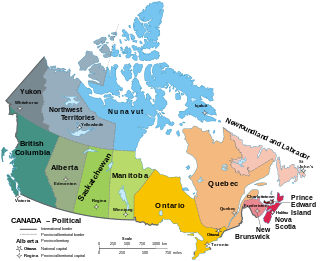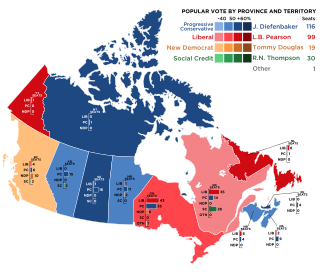The politics of Canada functions within a framework of parliamentary democracy and a federal system of parliamentary government with strong democratic traditions. Canada is a constitutional monarchy where the monarch is the ceremonial head of state. In practice, executive authority is entrusted to the Cabinet, a committee of ministers of the Crown chaired by the prime minister of Canada that act as the executive committee of the King's Privy Council for Canada and are responsible to the democratically elected House of Commons.

The Bloc Québécois is a federal political party in Canada devoted to Quebec nationalism and the promotion of Quebec sovereignty. The Bloc was formed by Members of Parliament (MPs) who defected from the federal Progressive Conservative Party and Liberal Party during the collapse of the Meech Lake Accord. Founder Lucien Bouchard had been a cabinet minister in the federal Progressive Conservative government of Brian Mulroney.

Canada has ten provinces and three territories that are sub-national administrative divisions under the jurisdiction of the Canadian Constitution. In the 1867 Canadian Confederation, three provinces of British North America—New Brunswick, Nova Scotia, and the Province of Canada —united to form a federation, becoming a fully independent country over the next century. Over its history, Canada's international borders have changed several times as it has added territories and provinces, making it the world's second-largest country by area.

The Quebec Liberal Party is a provincial political party in Quebec. It has been independent of the federal Liberal Party of Canada since 1955. The QLP has always been associated with the colour red; each of their main opponents in different eras have been generally associated with the colour blue.

The Communist Party of Canada is a federal political party in Canada. Founded in 1921 under conditions of illegality, it is the second oldest active political party in Canada, after the Liberal Party of Canada. Although it does not currently have any parliamentary representation, the party's candidates have previously been elected to the House of Commons, the Ontario legislature, the Manitoba legislature, and various municipal governments across the country.
The politics of Quebec are centred on a provincial government resembling that of the other Canadian provinces, namely a constitutional monarchy and parliamentary democracy. The capital of Quebec is Quebec City, where the Lieutenant Governor, Premier, the legislature, and cabinet reside.
The New Democratic Party is a social democratic political party in Canada.

The Social Credit Party of Canada, colloquially known as the Socreds, was a populist political party in Canada that promoted social credit theories of monetary reform. It was the federal wing of the Canadian social credit movement.
The Royal Commission on Bilingualism and Biculturalism was a Canadian royal commission established on 19 July 1963, by the government of Prime Minister Lester B. Pearson to "inquire into and report upon the existing state of bilingualism and biculturalism in Canada and to recommend what steps should be taken to develop the Canadian Confederation on the basis of an equal partnership between the two founding races, taking into account the contribution made by the other ethnic groups to the cultural enrichment of Canada and the measures that should be taken to safeguard that contribution".
The Constitutional debate of Canada is an ongoing debate covering various political issues regarding the fundamental law of the country. The debate can be traced back to the Royal Proclamation, issued on October 7, 1763, following the signing of the Treaty of Paris (1763) wherein France ceded most of New France to Great Britain in favour of keeping Guadeloupe.
Historically in Quebec, Canada, there were a number of political parties that were part of the Canadian social credit movement. There were various parties at different times with different names at the provincial level, all broadly following the social credit philosophy; at various times they had varying degrees of affiliation with the Social Credit Party of Canada at the federal level.

The 1962 Canadian federal election was held on June 18, 1962, to elect members of the House of Commons of Canada of the 25th Parliament of Canada. The governing Progressive Conservative (PC) Party won a plurality of seats in this election, and its majority government was reduced to a minority government.

The New Democratic Party of Quebec is a minor federalist and social-democratic provincial political party in Quebec, Canada. The party is a revival of the comparable Nouveau Parti Démocratique du Québec, which existed in various forms as the federal New Democratic Party (NDP)'s provincial affiliate in Quebec from 1963 to 1991. The current party, however, has never been connected with the federal NDP. The modern party was registered on 30 January 2014.

Marie Thérèse Casgrain,, née Forget was a French Canadian feminist, reformer, politician and senator. She was a leader in the fight for women's right to vote in the province of Quebec, as well as the first woman to lead a political party in Canada. In her later life she opposed nuclear weapons and was a consumer activist. A strong federalist, one of her last political actions, at age 83, was to intervene on the "No" side in the 1980 Quebec sovereignty referendum.
The New Democratic Party won thirteen seats in the 2000 federal election, emerging as the fourth-largest party in the House of Commons of Canada. Many of the party's candidates have their own biography pages; information on others may be found here.

Socialism in Canada has a long history and along with conservatism and liberalism is a political force in Canada.
The Parti de la démocratie socialiste was a provincial political party in Quebec, Canada.
Autonomism is a political doctrine which supports acquiring or preserving political autonomy of a nation or a region. It is not necessarily opposed to federalism, and souverainism necessarily implies autonomism, but not vice versa.
The New Democratic Party is a federal political party in Canada. Widely described as social democratic, the party sits at the centre-left to left-wing of the Canadian political spectrum, with the party generally sitting to the left of the Liberal Party. The party was founded in 1961 by the Co-operative Commonwealth Federation (CCF) and the Canadian Labour Congress (CLC).

Socialist Action is a Trotskyist political organization in Canada. Its members write for and distribute the North American newspaper, Socialist Action, published in San Francisco by the American group of the same name. It has a youth affiliate called Youth for Socialist Action (YSA),.









